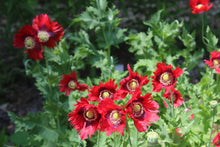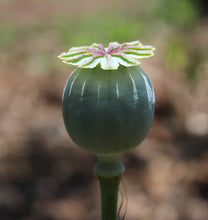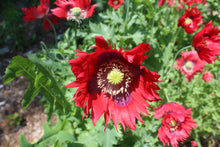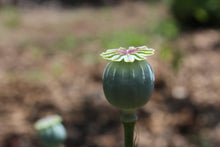'Ragged Red' Poppy
Regular price
$3.75
Sale
Papaver somniferum
Origin: Unknown
Improvement status: Cultivar
Seeds per packet: ~250
Germination tested 10/2025: 86%
Life cycle: Annual
Poppies have long been one of humanity's most important plants, a source of both food and medicine. This variety comes to us from Aaron Parker at Edgewood Nursery in Maine. He got it without a name from a friend named Pete, so he calls it "Pete's Papaver," but we believe it is an uncommon variety known as 'Ragged Red.' The name aptly describes the flower petals, which are a bright crimson red (think the color of the poppies in The Wizard of Oz), and are deeply fringed. It makes for an especially beautiful flower. Like other poppies of the species Papaver somniferum, it produces a large amount of grey-blue seeds which are tasty in bread, on salads, or in baked goods. The seeds also produce an edible oil much prized in certain cultures for cooking with or raw use. Additionally, this species is probably most well-known as the source of opium (the narcotic latex extracted from the unripe seed pods). It is illegal in the United States to extract opium from poppy pods — and it is even more illegal to "refine" the raw product into morphine or heroine. But while opium is a controlled substance, and by the letter of the law opium poppies and poppy straw are also illegal, opium poppy seeds are widely available from seed companies in the United States — and of course they can be found in most every supermarket across the country as a food product. We have not heard of anyone growing poppies as an ornamental or food crop running into trouble with the law, but we would be remiss if we didn't explain our understanding of the legal situation regarding the cultivation of this special plant. As long as you do not score the seed pods to extract the latex, you should be fine — but we are not lawyers, and this is not legal advice! Poppies are easy to grow, beautiful, and delicious. With any luck, they will re-seed in your garden and you'll have them coming back for years to come.
GROWING TIPS: Direct sow in late winter or very early spring, seeding onto bare soil when temps are fluctuating between freezing and thawing (frost seeding) is ideal. Seeding onto deep snow may lead to small seeds washing away. Poppies do not transplant well.
Grows well in full sun and any well drained soil. Self-sows, but best to pull back mulch from areas where self-seeding is desired.








